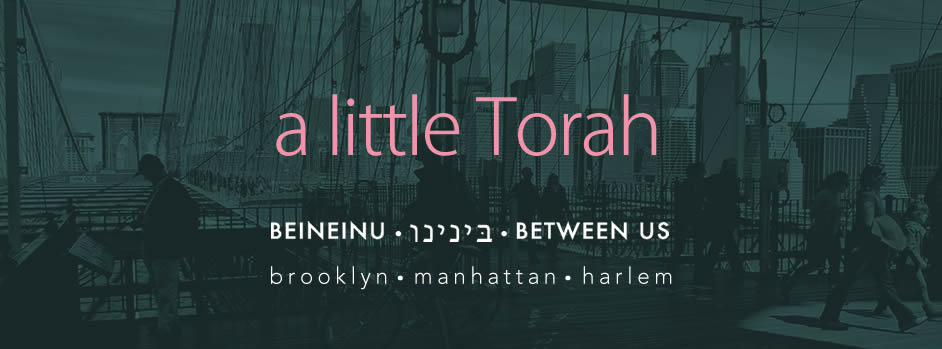TORAH - IN THE NEWS - JUST JUSTICE - HARLEM SHABBAT SING - TOILETRIES +
It's not too late.
Register now.
Or just show up.
Either way.
Just come.
Celebrate Shabbat.
Tonight.
Shabbat Beineinu.
Details below.
Parshat Ki Tisa
Exodus 30:11-34:35
This is my favorite Torah portion. That's right! If I could only have one Torah portion, this is the one I would choose. It's got everything!
Mt. Sinai+two Tablets+major freak out+Golden Calf+God's anger+Moshe's anger+
two smashed Tablets+Moshe's compassion+two new tablets
READ THE ENTIRE STORY but in the meantime, here's the recap:
The Israelites are still wondering in the desert - the wilderness - the unknown place of mystery and wonder. Moses is on top of Mt. Sinai getting the first installment of the Torah. He is supposed to return in 40 nights. Aaron is in charge. It's the 40th day and the people, not remembering that he is supposed to return at night, freak out. This isn't an "I can't find my keys freak out." This is an "I left my cell phone (AKA my soul) somewhere in JFK." @#$%!!!!! [Side note: this actually happened to me but that's another story.]
The Israelites are out of control and start yelling at Aaron. They feel abandoned and totally lost. Not only can't they see their [supposed ]God, but now they can't even see their leader. Everyone seems to be falling apart.
Aaron takes control (sort of) by coming up with what he thinks is an absolutely ridiculous idea that the Israelites will immediately reject. Aaron commands all of the women and children to bring their gold earings to be melted into a god. Not only do they not reject this idea, but EVERYONE contributes. Women, children, men and even Hebrew slaves race to bring their gold. They bring so much that Aaron has to tell them to stop.
What's he going to do now? He has to go through with plan in order to keep the people calm or at least distracted. Aaron fashions a golden calf and the people seem to be comforted by the presence of this idol. It's familiar. Remember, in Egypt, they were used to worshipping multiple gods and idols (this was the practice for all people at this time).
Meanwhile, back at the ranch, AKA up on Mt. Sinai, God is putting the finishing touches on the Torah. God sees what the people have done and is furious. God tells Moshe that the deals off. But Moshe reminds God that a Brit is a Brit. Once it's made, it's forever - no matter how badly the kids behave. God calms down and Moses begins to descend, tablets in hand. As he draws closer to the camp, he hears the partying below. Then he sees it and he is so angry he hurls the tablets and they shatter. [Side note: as a punishment for creating the golden calf, it's melted down and then the Israelites are forced to drink it!]
Moses goes back up the Mountain. A Brit is a Brit. Once it's established, it's forever. He needs to get a second set of tablets. This time Moses writes the tablets. Before he descends, he asks God for a favor, he wants to see God's face. Moses has been working hard for a very long time. He and God are very close. Today we would call them "BFF's" and they would each wear 1/2 of the heart necklace as an expression of their deep love for on another. All this time and yet, Moses still hasn't seen God.
God wants to honor the request but knows that it will be too much. Instead God tells Moses to cover his face. God will pass by and then tell Moses to remove his hand enabling him to see God's backside. THIS IS THE REASON I LOVE THIS TORAH PORTION. God's backside is called "Kol Tuvi" - All of my goodness. There are many aspects of God that are revealed in the Torah and in this Torah portion; rage and regret are just two. However, when it's time for God to choose the one that is most important, God chooses goodness. God leaves Moses with goodness.
This is gorgeous! What a powerful teaching. Leave 'em with goodness.
We are complex beings with many attributes. Some more pleasant and appealing than others. No matter what happens, we should always try to leave people with "Kol Tuvi" - All of our goodness.
What would that look like? What would it sound like? What would it be like if everyone left one another with all of their goodness?
Mekor Ha'Chayiim, Source of Life, as we move into Shabbat let us think of the many ways we share our goodness with others. Let us dedicate Shabbat to leaving our goodness behind for others to absorb.
Shabbat shalom,
Laurie
